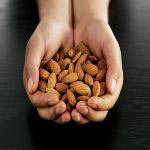
For years, doctors have been telling patients to cut down on saturated fats — the kinds of fats in meats and milk, for example. Reducing fat in the diet, especially saturated fat, was believed to be an important strategy to reduce heart disease.
Now, a new study says reducing fats isn't enough. We have to focus on the kinds of fats we eat.
Previous studies found that people who ate a lot of saturated fats were more likely to have a lot of the kinds of cholesterol that can clog arteries and lead to heart attacks. But there was little direct evidence to show that cutting saturated fats actually lowered the risk of heart disease.
"And we wanted to look at whether replacing saturated fat with polyunsaturated fat, with a healthy fat rather than, for example, with carbohydrates or protein or other things, was beneficial," says Dr. Dariush Mozaffarian of the Harvard School of Public Health. He thought the answer might lie in the numerous studies over the years that looked at diet and heart disease.
"And so, we wanted to do a systematic review of all the literature, find all of the appropriate studies and pool them to see if together, there's a benefit for replacing saturated fat specifically with polyunsaturated fat."
So Mozaffarian and his colleagues studied the studies, eight of them, in which some participants ate less saturated fat and more polyunsaturated fats, the kind of fats that are in fish, nuts, and vegetable oils. They were compared with a control group that had more saturated fat in their diets.
This kind of research is called a meta-analysis. Often combining the results of several similar studies can produce conclusions that the individual studies don't support. Sometimes that's partly because combining studies increases the number of people participating in the research. In this case, the combined studies included more than 13,000 people.
Reducing saturated fats may reduce cholesterol, but low fat diets alone don't seem to do much to actually reduce clogged arteries and heart attacks.
"There's actually, in the last several years, been convincing evidence that replacing saturated fat in one's diet with carbohydrates has very little effect on heart disease. And so if that's not going to produce benefit, what sorts of replacements [for saturated fats] might?"
Mozaffarian's study found that people who replaced saturated fat with polyunsaturated fat had about a 20 percent lower risk of heart attack or other heart disease.
It's still not exactly clear how the polyunsaturated fats confer this benefit. But the researcher says their effect on cholesterol may be part of the answer.
"So for example, dietary fats also actually, in many cases, improve HDL cholesterol, the good cholesterol, compared to carbohydrates, and they actually lower triglycerides, a type of blood lipid which is associated with harm."
But Mozaffarian said dietary fats may also affect blood pressure and inflammation of the blood vessels; they may even have an impact on the heart's electrical function.
Whatever the mechanism, the study does suggest some guidance for people who want to lower their risk of heart disease.
"They can't just look at a product that says 'low grams of saturated fat' or 'low saturated fat' and assume that it's healthy," he said. "If you're taking out the saturated fat, what are you replacing it with?"
And it doesn't mean we have to spend a lot of time parsing the nutritional labeling that is now on packaged foods in many countries.
"If someone says I should eat fruits, vegetables, whole grains, fish, nuts, and avoid processed foods, sugary beverages, and foods with trans fats or high in salt, that's actually much simpler, I think, than chasing all of these numbers."
Professor Dariush Mozaffarian of Harvard School of Public Health. His study was published this week in the journal PLoS Medicine.
polyunsaturated: (of many vegetable fats and some animal fats) having a chemical structure which does not encourage the harmful development of cholesterol(多种植物脂肪和某些动物脂肪)含多重不饱和化合物的;抗胆固醇的
carbohydrates: a substance such as sugar or starch that consists of carbon, hydrogen and oxygen. 碳水化合物;糖类
triglyceride: a lipid, an ester of glycerol and three fatty acids (the same or different); the major constituent of animal and vegetable fats 甘油三酸酯
parse: to divide a sentence into parts and describe the grammar of each word or part (对句子)作语法分析;作句法分析
trans fat: a type of unsaturated fat with trans-isomer fatty acid 反式脂肪酸
What the world's healthiest people eat
(来源:VOA 编辑:陈丹妮)
